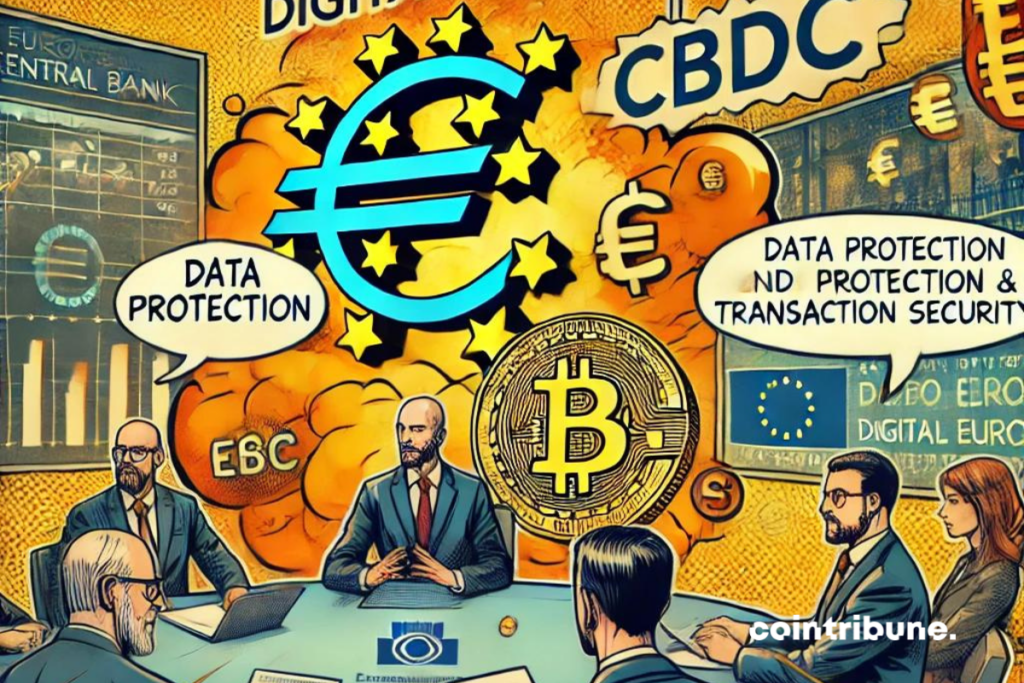Digital Euro: ECB Report On CBDCs And Data Protection
The European Central Bank (ECB) has recently released a crucial report on the development of its central bank digital currency (CBDC). This first progress report, unveiled on June 24, places particular emphasis on data protection, a sensitive issue at the heart of consumer and industry expert concerns. By promising pseudonymization and independent audits, the ECB aims to allay fears related to transaction traceability.

The ECB’s Promises
The ECB has taken steps to ensure the confidentiality of transactions conducted with the digital Euro. The report promises pseudonymization mechanisms, hash functions, and robust encryption techniques to protect user data.
These measures aim to prevent unauthorized third parties from tracing individual transactions, thus addressing major consumer privacy concerns.
In addition to these guarantees, the ECB has stipulated that payment service providers will not be able to use consumer financial data for commercial purposes without explicit consent.
This approach complies with the stringent data protection standards in effect in the European Union, particularly the General Data Protection Regulation (GDPR).
Offline transactions have also been addressed. The ECB proposes solutions to enable direct payments between parties, without intermediaries, using smartphones or smart cards. These devices should synchronize transactions with the CBDC blockchain, thereby ensuring their security and efficiency.
Technical and Regulatory Development: An Evolving Framework
The ECB report not only outlines data protection measures but also sets clear objectives for the technical and regulatory development of the digital Euro.
The newly established “Rulebook Development Group” will be tasked with finalizing the technical and regulatory framework for the CBDC by the end of 2024. This initiative will include consultations with service providers, infrastructure builders, and the general public.
This collaborative approach aims to create a robust regulatory and technical environment capable of supporting the widespread adoption of the digital Euro. The consultations will ensure that the concerns of various market players are considered, which should facilitate a smooth transition to this new financial model.
Privacy Challenges and CBDC Criticisms
Despite the ECB’s promises, criticisms of CBDCs continue to grow, particularly regarding privacy and individual freedom issues.
At the recent Oslo Freedom Forum, many speakers highlighted the potential risks associated with state-controlled digital currencies. They cited examples where governments have abused their power to seize dissidents’ assets, illustrating the dangers of centralized control over personal finances.
A 2023 report by Trezor reveals that 73% of respondents fear that CBDCs give governments excessive control over consumer behavior. These concerns raise questions about the necessity and redundancy of CBDCs compared to stablecoins, which already offer a digital alternative to fiat currencies.
The ECB’s report on the digital Euro marks an essential step in the development of CBDCs in Europe. By focusing on data protection and transaction security, the ECB aims to address legitimate consumer concerns. However, persistent criticisms and upcoming challenges indicate that the path to widespread adoption remains fraught with obstacles. Meanwhile, Donald Trump charms with crypto.
Maximize your Cointribune experience with our "Read to Earn" program! For every article you read, earn points and access exclusive rewards. Sign up now and start earning benefits.

Fascinated by Bitcoin since 2017, Evariste has continuously researched the subject. While his initial interest was in trading, he now actively seeks to understand all advances centered on cryptocurrencies. As an editor, he strives to consistently deliver high-quality work that reflects the state of the sector as a whole.
The views, thoughts, and opinions expressed in this article belong solely to the author, and should not be taken as investment advice. Do your own research before taking any investment decisions.